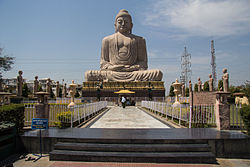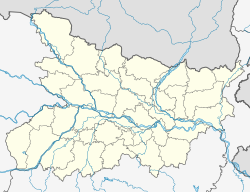Bodh Gaya
|
Bodh Gaya Bōdh Gayā ji |
|
|---|---|

Great Buddha Statue
|
|
| Coordinates: 24°41′42″N 84°59′29″E / 24.695102°N 84.991275°ECoordinates: 24°41′42″N 84°59′29″E / 24.695102°N 84.991275°E | |
| Country |
|
| State | Bihar |
| District | Gaya |
| Area(2015) | |
| • City | 20.2 km2 (7.8 sq mi) |
| • Regional planning | 83.78 km2 (32.35 sq mi) |
| Population (2015) | |
| • Total | 45,349 |
| Languages | |
| • Spoken | Magadhi, Hindi |
| Time zone | IST (UTC+5:30) |
| PIN | 824231 |
| Vehicle registration | BR-02 |
Bodh Gaya is a religious site and place of pilgrimage associated with the Mahabodhi Temple Complex in Gaya district in the Indian state of Bihar. It is famous as it is the place where Gautama Buddha is said to have obtained Enlightenment (Pali: bodhi) under what became known as the Bodhi Tree.
For Buddhists, Bodh Gaya is the most important of the main four pilgrimage sites related to the life of Gautama Buddha, the other three being Kushinagar, Lumbini, and Sarnath. In 2002, Mahabodhi Temple, located in Bodh Gaya, became a UNESCO World Heritage Site.
Bodh Gaya is the most holy place for the followers of the Buddhist faith all over the world. Situated by the bank of river Neranjana the place was then known as Uruwela. King Ashoka was the first to build a temple here.
Traditionally, Buddha was born in 563 BC in what is now Nepal on the following auspicious Baisakhi purnima. As Siddhartha, he renounced his family at the age of 29 in 534 BC and travelled and meditated in search of truth. After practicing self-mortification for six years at Urubela (Buddhagaya) in Gaya, he gave up that practice because it did not give him Vimukthi. Then he discovered Noble Eight-fold path without help from anyone and practiced it, then he attained Buddhatva or enlightenment. Enlightenment is a state of being completely free from lust (raga), hatred (dosa) and delusion (moha). By gaining enlightenment, you enter Nibbana, in which the final stage is Parinibbana.
At this place, the Buddha was abandoned by the five men who had been his companions of earlier austerities. All they saw was an ordinary man; they mocked his well-nourished appearance. "Here comes the mendicant Gautama," they said, "who has turned away from asceticism. He is certainly not worth our respect." When they reminded him of his former vows, the Buddha replied, "Austerities only confuse the mind. In the exhaustion and mental stupor to which they lead, one can no longer understand the ordinary things of life, still less the truth that lies beyond the senses. I have given up extremes of either luxury or asceticism. I have discovered the Middle Way". This is the path which is neither easy (a rich prince) nor hard (living in austere conditions practicing self-denial). Hearing this, the five ascetics became the Buddha's first disciples in Deer Park, Sarnath, 13 km n.e. of Benares.
...
Wikipedia

